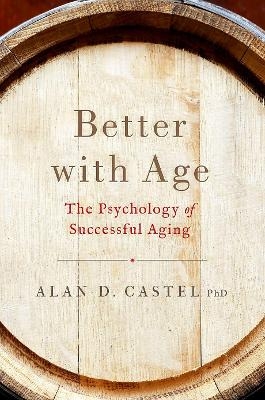
Better With Age
Oxford University Press Inc (Verlag)
978-0-19-027998-1 (ISBN)
We are all aging, yet most adults say they don't feel all that old. Our age is an important number, but it can also be deceiving. After the age of 40, most people say they feel younger than their age, some lie about their age, and many attempt to hide the signs of aging. The psychology of aging tries to make sense of not only how people age, but how our beliefs, behaviors, and expectations influence how well we age.
Better with Age addresses the many myths and paradoxes about aging. Often, peoples' expectations of old age do not match what is actually experienced in old age. For example, most people think of old age in terms of decline, grumpiness, aches and pains, but healthy older people report high levels of happiness, focus on positive emotions and enjoy humor. Older people may be forgetful, but selectively remember what is important. By having more experiences to draw on, wisdom and creativity can blossom. Walking and physical exercise, not just brain training exercises, keeps our mind sharp. Old and new habits, hobbies, and friends keep us connected. Retirement is initially confusing, and sometimes avoided, but is often busy and rewarding. Balance, both physical and mental, becomes more important in older age.
Successful aging involves leading a productive, healthy, happy life, and can start well before you reach old age. We have older role models who provide inspiring examples of what we can do in older age. This book presents the paradoxes and pleasures of old age, new research and role models of successful aging, and what we can do now to enjoy old age.
Alan D. Castel is a Professor in the Department of Psychology at the University of California, Los Angeles. His research focuses on how cognition changes with age and how people selectively remember important events. His work the National Institute on Aging. His work has been featured in The New York Times and Time Magazine. He received his PhD from the University of Toronto in 2004, completed a post-doctoral fellowship at Washington University in St. Louis, and has been a faculty member in the Department of at UCLA since 2006. He lives in Los Angeles, California, with his wife and three children.
Prologue - How I Got Interested in Successful Aging at a Young AgeIntroduction - The Benefits of Aging and the Psychology of Successful Aging Chapter 1: What Is Successful Aging? Chapter 2: Happiness: A Funny Thing Happens as We Get Older Chapter 3: Memory: Our Memory Becomes More Selective with Age Chapter 4: Wisdom: The Benefits of Experience and Creativity Chapter 5: Staying Sharp: What Is an Active Lifestyle? Chapter 6: Brain Training: Can Computer Games Make Me Smarter? Chapter 7: Habits and Hobbies: Old and New Friends Chapter 8: Retiring and Rewiring: The New "R & R" of Old Age Chapter 9: It Gets Even Better with Age: Start Successful Aging NowClosing CommentsEpilogue - Are You Aging, or Is It Just Me?Notes & ReferencesAcknowledgementsIndex
| Erscheinungsdatum | 21.08.2018 |
|---|---|
| Verlagsort | New York |
| Sprache | englisch |
| Maße | 163 x 236 mm |
| Gewicht | 567 g |
| Themenwelt | Sachbuch/Ratgeber ► Gesundheit / Leben / Psychologie ► Lebenshilfe / Lebensführung |
| Geisteswissenschaften ► Psychologie ► Entwicklungspsychologie | |
| Geisteswissenschaften ► Psychologie ► Sozialpsychologie | |
| Geisteswissenschaften ► Psychologie ► Verhaltenstherapie | |
| Sozialwissenschaften ► Soziologie | |
| ISBN-10 | 0-19-027998-2 / 0190279982 |
| ISBN-13 | 978-0-19-027998-1 / 9780190279981 |
| Zustand | Neuware |
| Informationen gemäß Produktsicherheitsverordnung (GPSR) | |
| Haben Sie eine Frage zum Produkt? |
aus dem Bereich


